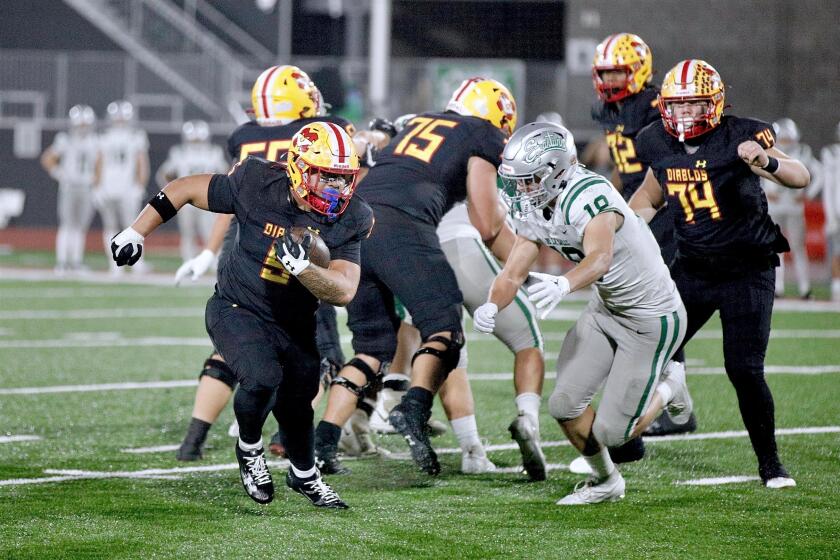ON THE ROAD TO GLORY : Florida Freshman Emmitt Smith Is Putting Himself in the Running for a Collection of Heisman Trophies
GAINESVILLE, Fla. — Take a lesson in understatement from Galen Hall and Larry Kirksey, the University of Florida coaches who before the season described the Gators’ running back situation with all manner of caution.
“We enter fall practice with a close battle between Octavius Gould and Wayne Williams,” said Hall, the head coach. “There are others who could get in the scrap and help us.”
Said Kirksey, who coaches the running backs: “It’s possible that some incoming players might also be able to help us.”
Could? Possible? Might? In the third game of the season, Emmitt Smith, an 18-year-old freshman who left Escambia High School in Pensacola as the third-leading rusher in prep history, set a school record by rushing for 224 yards in a 23-14 upset of Alabama.
Seven games into the season, his 144.4-yards per game average ranks first in the nation, his total of 1,011 yards not only is higher than anyone’s but makes him the first freshman to have gained 1,000 yards in so few games, and the school records he has set are too numerous to mention. It hasn’t taken long for the comparisons to begin to a couple of former Southeastern Conference running backs--Herschel Walker of Georgia and Bo Jackson of Auburn, both of whom won the you-know-what before they were done.
Give credit for realistic vision to Gould, the former starter. A sophomore, he saw the writing on the depth chart and has left the team.
At 18, Smith is an interesting combination of modest schoolboy and big-time college athlete. Ask him cautiously if he ever thinks about the possibility of winning the Heisman Trophy, and he says right out that he wants to win “two or three.”
“Nothing wrong with wanting,” he says.
Only Archie Griffin ever has won two, winning consecutively at Ohio State in 1974 and ’75.
In the midst of all this talk, a few people are keeping in mind that he is, after all, a freshman, and not yet definitively the best back even in the Southeastern Conference.
“To compare him to people like Billy Sims and Joe Washington, you can’t do that yet,” said Hall, who worked with both as an assistant at Oklahoma. “The stats are there, but great players are great through four years of college and go on to the NFL. Emmitt has played seven games.”
From Hall, to Smith’s teammates, to his former coaches, Smith is described as an all-around good guy and model citizen. When he spent the week before high school graduation--normally beach-party time--speaking to potential dropouts, his already lofty hometown status soared even higher.
Dwight Thomas, his high school coach, makes Smith sound like a personification of the Ten Commandments.
“He says yes sir and no sir, sits in the front row in class, makes A’s and B’s, honors his mother and father, gives credit for all he does to his Heavenly Father, never swears and never says bad things about people,” said Thomas, coach of an Escambia team that is 2-2 this year and whose 1987 season outlook was simply headlined in a local paper, “Without Emmitt.”
When Smith graduated, taking his 8,804 yards and memories of two state championships with him, Thomas didn’t go to the ceremony. “It would have been too sad,” he said.
Of course, it is not what Smith does off the field that has left him the center of such a scramble of attention that he has begun to worry about it. “I do wonder,” Smith said the other day. “I don’t care too much for talking about myself, so I worry about it a lot.”
In spite of a spectacular prep career--only Ken Hall of Sugar Land High School, in Sugar Land, Tex., and Sal Gonzales of Gasden High in Anthony, N.M., gained more yards--it has been a surprise to many that Smith has been able to have such success so soon. Even to Smith himself, depending on whose account you believe.
“I thought I would be in the backup role and be a play runner (messenger),” Smith said.
But Jimmy Nichols, formerly the offensive coordinator at Escambia and now head coach at Washington High, a cross-town rival, recalls watching Florida’s spring football game last year with Smith, who turned to him and said simply: “I can play with these boys.”
Just why he can play with these boys is a bit more difficult to figure out.
His shuffling, rambling style is so difficult to analyze, in fact, that some have taken to calling it ineffable, simply because they can’t find the words to describe it. Better yet, call it inEmmittable.
“I don’t know when I’ve been around one exactly like him,” said Hall, who, in his 18 years as an assistant at Oklahoma before moving on to Florida in 1984, worked with such runners as Sims and Washington.
The difficulty in describing Smith’s style comes as much from what he doesn’t do as what he does. Two of the most obvious and essential qualities of a running back are size and speed, and Smith has neither in great quantity.
He is 5 feet 10 inches tall, and weighs somewhere between the 185 pounds at which he graduated from high school and the 201 pounds that he would weigh only in full pads and with a fully inflated football cradled in his arm. Walker and Jackson, by contrast, were both about 6-1 and 220 in college.
Nor is he very fast. He has not yet been timed at Florida, but other reports range from a respectable, but not spectacular 4.4-second 40-yard dash--a likely exaggerated high school timing that Smith himself doubts--to a sluggish 4.6. Smith himself estimates his time at “maybe” 4.5. Tony Dorsett, he isn’t.
“He just runs fast enough, that’s the way I see it,” said Johnny Nichols, a freshman who played quarterback at Escambia. Nichols is the son of the former offensive coordinator and now rooms with Smith at Florida. “He runs just fast enough to get to the end zone.”
Kerwin Bell, the Florida quarterback who was much-ballyhooed before a slow start and the coming of Smith pushed him to the rear, thinks of Smith’s speed as situational.
“I think he’s a lot faster with people coming after him,” Bell said. “He never gets caught from behind.”
He is neither fast nor big, but he keeps getting the job done. He scored his first touchdown as a Gator on a 66-yard run against Tulsa, and since then has scored 10 more.
Against Alabama, in his first collegiate start, he broke a couple of runs that made a national television audience sit up and take notice. The next week, against Mississippi State, he scored three touchdowns. In a 13-10 loss to Louisiana State, he ran for 184 yards. His worst performance as a starter was in a 65-0 victory over Cal State Fullerton, in which he rushed for 130 yards in 22 carries, a part-time performance that prompted Gene Murphy, Fullerton’s coach, to say, “He’s 18? He runs like he’s 28.”
And like many a running back, Smith can no more tell you how he does what he does than you can go out and do it.
“It’s kind of hard to explain,” Smith said. “I don’t go up in my room and practice the things I do on the field. Mainly I just try to avoid contact.”
Right.
Most attempts to dissect Smith’s ability credit a couple of vague and unquantifiable talents--balance and vision.
The balance, Smith figures, comes in part from a childhood habit of walking curbs, fences and brick walls, just because they were there. “I’d do it as long as I could, or until there was just no point in doing it anymore,” he said.
His close-to-the-ground strides, plus that balance, help keep him from being easily toppled.
“He has an uncanny style of running,” said Kirksey, the Florida assistant. “It looks like he’s not moving that much, but he’s in perpetual motion. He’s hard to get a shot at, and once he falls, he falls forward. He never gets knocked back. That’s a sign of a great back.”
Rather than breaking tackles or punishing defenders, Smith seems to shirk them. More than one would-be tackler has thought he had Smith in his grasp, only to watch him scamper by.
Talk of his vision is simply a way to try to explain why Smith is so adept at finding holes and getting through them.
“I look at him after I hand him the ball and I’m just amazed,” Bell said. “One hole will be 90 degrees from where he’s headed and he’ll find it.”
Watching him, you can see how Smith seems almost to stop, take in the blocking and change his routes.
“Before I get the ball, I try to visualize the blocks and where the holes are going to be,” Smith said. “If it happens the way I visualize, I just go. Once it gets to a point I know I didn’t visualize, I just try to get back to my vision.”
Mindful himself that he is, after all, a freshman, Smith said he will expect success on only modest terms--say, 120 yards a game and a minimum 1,000 a season.
“I’m not going out and trying to set every record in the NCAA books,” Smith said. “I’m a long way from being great.”
Time will tell. Thus far, though, he made his greatest discovery about college football when he reached the end zone after that 66-yard run against Tulsa for his first college touchdown. Not one who usually engages in self-congratulatory celebration in the end zone, Smith practically had a party after that one, leaping all around even before he had crossed the goal line.
“I kind of had a feeling like, it’s just like high school,” he said. “The end zone is here.”
More to Read
Go beyond the scoreboard
Get the latest on L.A.'s teams in the daily Sports Report newsletter.
You may occasionally receive promotional content from the Los Angeles Times.










